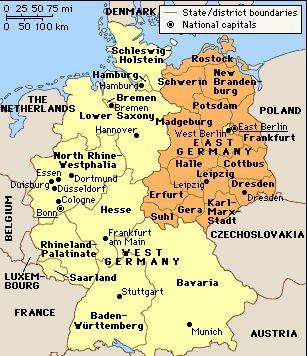In recent political debates, terms like “socialism” and “democratic socialism” are often used interchangeably, yet their meanings and historical implementations vary significantly. A new article from Left Voice challenges common misconceptions by arguing that East Germany was never truly socialist, nor does contemporary “democratic socialism” fit the traditional socialist mold. The piece critically examines the ideological foundations and practical realities behind these labels, aiming to clarify what socialism has-and hasn’t-looked like in both history and today’s political landscape.
East Germany’s State Capitalism Exposed The Illusion of Socialist Identity
Contrary to popular narratives, the German Democratic Republic (GDR) never truly embodied socialism. What existed was a rigid form of state capitalism, where the ruling Socialist Unity Party maintained strict control over economic assets without dismantling capitalist class structures. Workers remained alienated from the means of production, and the state acted more as a capitalist enterprise manager rather than a facilitator of genuine socialist democracy. This system prioritized industrial output and military power over the welfare and democratic participation of its citizens, exposing the fundamental contradictions between the rhetoric of socialism and its execution in East Germany.
Key features that disproved the socialist label include:
- Centralized bureaucratic control with minimal grassroots worker input
- Market mechanisms disguised as planned economy elements
- Perpetuation of social hierarchies within the political elite
- Restriction of political freedoms under the guise of socialism
| Aspect | Socialist Ideal | GDR Reality |
|---|---|---|
| Ownership | Workers’ collective ownership | State ownership controlled by party elite |
| Worker Power | Direct democratic control | Bureaucratic management, limited participation |
| Economic Model | Provision for all, equality-focused | Output-driven, prioritizing state agendas |
| Political Freedom | Pluralistic and democratic | Suppressed dissent and one-party rule |
Understanding Democratic Socialism’s True Economic Model and Its Limits
At its core, democratic socialism envisions an economy where the means of production are either publicly owned or heavily regulated to ensure equitable distribution of resources and wealth. Unlike the rigid state control seen in East Germany, democratic socialism champions pluralistic ownership models, combining cooperatives, strong social welfare programs, and open markets with robust government oversight. The focus is on democratizing the economy-not just the political system-so workers and communities have a tangible voice in economic decisions. This framework aims to address systemic inequalities without replicating the authoritarian controls that marked 20th-century “socialist states.”
However, this economic model faces clear limitations. Its success hinges on the balance between market freedom and government intervention, a precarious tension that can lead to inefficiencies or unintended consequences. For example, while socialized healthcare or education can expand access, too much bureaucracy risks stifling innovation and responsiveness. Below is a simplified comparison of key economic features illustrating these constraints:
| Economic Feature | Democratic Socialism | Capitalism | Authoritarian Socialism |
|---|---|---|---|
| Ownership | Mixed (public, cooperatives, private) | Primarily private | State-owned |
| Market Role | Regulated markets | Free markets | Central planning |
| Worker Control | Significant influence | Limited influence | Minimal influence |
| Economic Freedom | Moderate | High | Low |
| Risk of Bureaucracy | Moderate | Low | High |
- Democratic socialism promotes inclusive economic participation but grapples with balancing efficiency and equity.
- Its limits become apparent when bureaucratic growth threatens innovation or when political will wanes to sustain redistributive programs.
- It stands distinct from authoritarian approaches, emphasizing democracy alongside economic reform.
Charting a Path Forward Recommendations for Genuine Socialist Alternatives
To build a truly socialist society, it is essential to discard the illusions perpetuated by capitalist frameworks that merely dress themselves in leftist rhetoric. Authentic socialism demands the abolition of private ownership over the means of production, not just regulatory reforms or expanded welfare states. This means fostering democratic control through workers’ councils and community assemblies, establishing a system that places human needs above profits. The path forward involves:
- Comprehensive social ownership: Transition industries and resources into collective hands, operated and managed by the working class.
- Direct democracy: Empower communities and workplaces with decision-making authority to replace hierarchical governance structures.
- International solidarity: Connect struggles globally against imperialism and capitalist exploitation to build an interconnected socialist movement.
Implementing these principles requires confronting both external capitalist pressures and internal bureaucratic tendencies that historically corrupted socialist projects. To visualize this, consider the contrasting priorities between genuine socialism and pseudo-socialist reforms illustrated below:
| Aspect | Pseudo-Socialist Reform | Genuine Socialist Alternative |
|---|---|---|
| Ownership | State or private monopoly | Collective and democratic control |
| Decision-Making | Top-down bureaucratic management | Grassroots, participatory democracy |
| Economic Goal | Profit-maximization under market constraints | Meeting social needs and sustainability |
| Internationalism | National self-interest and protectionism | Global working-class solidarity |
Closing Remarks
In reevaluating the legacy of East Germany and the contemporary appeal of “democratic socialism,” it becomes clear that neither fully aligns with the principles of genuine socialism. As debates over economic and political models continue to shape public discourse, distinguishing between state-controlled regimes and movements advocating for democratic, worker-centered socialism remains crucial. This analysis underscores the importance of historical accuracy and ideological clarity in understanding the complexities behind labels that are often conflated in today’s political landscape.




